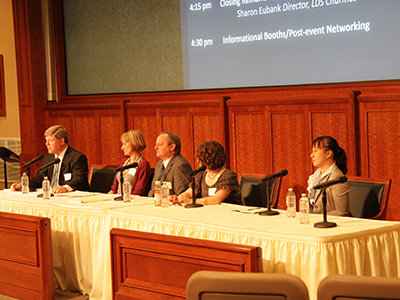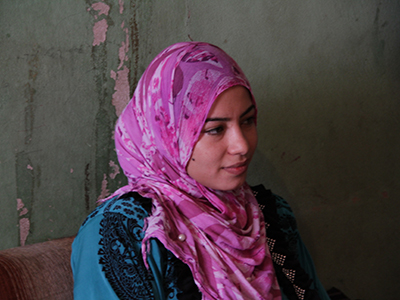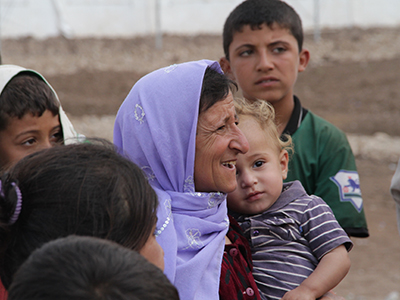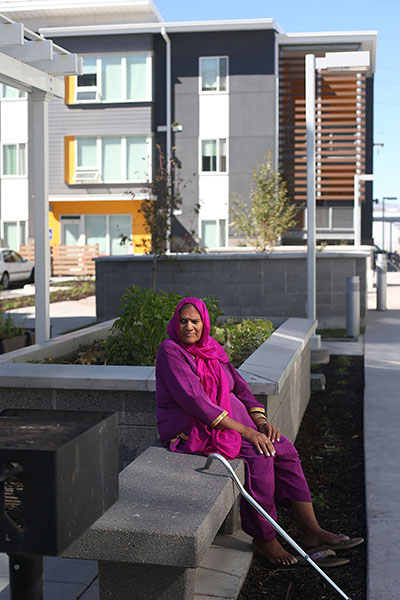LDS Charities Hosts Conference to Discuss Help for Refugees
Contributed By Jason Swensen, Church News staff writer
.jpg)
Church leaders addressed the state of refugees across the globe during a refugee conference at Church headquarters on February 13, 2015.
Article Highlights
- LDS Charities and the Middle East refugee organization AMAR U.S. held a one-day conference discussing refugees on February 13.
- The conference raised awareness for others to “think globally—act locally.”
“People of good will can rise up and say, ‘I can do something.’” —Sharon Eubank, LDS Charities director
Related Links
A sizable majority of the workforce at the Latter-day Saint Humanitarian Center in Salt Lake City is refugees. Most are women and very few are Church members. But almost all are making giant strides in their daily trek to self-reliance and assimilation into their new culture. That’s great news for many refugee families who have known only fear and hopelessness.
Refugees are a tragic by-product of an increasingly volatile and violent world. Every week, approximately 185,000 people—nearly equal to the population of Salt Lake City—are driven from their homes and villages by political conflict. That grim figure—along with many other realities surrounding the growing number of refugees across the globe—were anchoring elements at a February 13 conference in the Church Office Building focusing on the world’s alarming refugee crisis.
Hosted by LDS Charities and the Middle East refugee assistance organization AMAR U.S., the one-day conference raised awareness of the many challenges facing refugees. Presenters and panelists also shared ideas on assisting Utah’s own growing refugee communities, including ways to utilize each refugee’s unique talents and traits.

Deseret Industries director Lee Hardy, far left, moderates a panel discussion about employing refugees at the February 13, 2015, refugee conference hosted by the Church. Photo by Jason Swensen.

Maha Hammoud, 20, fled Syria with her family and now lives in Beirut, Lebanon. Members of The Church of Jesus Christ of Latter-day Saints helped her family by taking them needed food and supplies. Photo by Sarah Jane Weaver.

Church leaders addressed the state of refugees across the globe during a refugee conference at Church headquarters on February 13, 2015. Photo by Sarah Jane Weaver.

Kaneez Fatima sits outside an apartment complex in Salt Lake City that provides affordable housing for refugees and other low-income people. Photo by Laura Seitz, Deseret News.
The familiar adage “think globally—act locally” is apt advice for Latter-day Saints and others who want to help ease the suffering of the world’s estimated 51.2 million refugees and internally displaced people.
“The best thing you can do to help a refugee is to befriend a refugee,” said Gerald Brown, director of Utah’s refugee services office.
LDS Charities director Sharon Eubank noted there are more displaced people today “than at any time since World War II.”
Instability in the nations of Syria, South Sudan, the Central African Republic, and other volatile regions has triggered historic numbers of refugees.
Children are bearing the brunt of the global refugee crisis, said Sister Eubank. Often, she added, “the children have to work and forgo school. … Their childhoods have been stolen from them.” Many are being criminally exploited.
Government and private humanitarian agencies alike are working to provide services, relief, and hope to refugee communities. But several presenters at the conference emphasized that individuals and local communities can also be key allies in confronting the refugee crisis. “People of good will can rise up and say, ‘I can do something,’” said Sister Eubank.
Larry Bartlett, the U.S. State Department’s director of refugee admissions, said federal agencies sometimes have limited influence on what happens on the ground. “There remains a great need for local community advocates working closely with elected officials,” he said.
Mr. Bartlett added that refugees resettled in the United States are sometimes viewed as burdens to their new communities. But local resettlement advocates can “share the message” that refugees can enrich neighborhoods.
Found in each individual person is a unique talent to be valued and utilized, said Baroness Emma Nicholson of Winterbourne, the president of AMAR U.S. and the United Kingdom’s trade envoy to Iraq. In her conference keynote address, Baroness Nicholson spoke of her recent travels near the Iraqi-Syrian border where she witnessed the tragic plight of “lost people” displaced from their homes by the militant Islamic State. Most, she said, have endured deep levels of abuse and horror. “Some are literally speechless—they can’t speak anymore.” Global relief organizations such as AMAR and LDS Charities—along with individuals and local agencies—share the task of finding permanent solutions to the world’s historic refugee crisis.
Refugees and other displaced, “lost” people, of course, need food, warmth, and medical attention, said Baroness Nicholson. But they also require reliable social structures, access to information resources, and, yes, friendship and personal relationships. “The spark of life inside each human being deserves to grow and burn and turn into a flame,” she said.
Deseret Industries director Lee Hardy moderated a panel discussion about employing refugees in local communities. The conference, he said, demonstrated the cooperative power of governments, local agencies, and private organizations such as the Church.
“It’s exciting to see what happens when participants work together,” he added. Chris Petrick, a Deseret Industries development manager, said working with refugees is not always easy. “But each of the individuals I have come to know are extremely resilient. … They see what the future can hold.”
How to help. The Church advocates support for local community efforts that assist resettled refugees, and it especially encourages the volunteerism of its members in these causes. For more information about LDS Charities, visit ldscharities.org.
